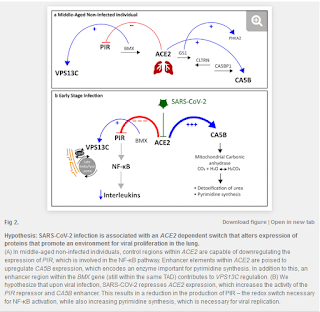Binding of SARS-CoV-2 to ACE2 does not affect ACE2 enzymatic function
The Biochemical Society posted a recording of a fascinating webinar titled ACE2: Friend or Foe. I have indexed the third portion, a talk by Prof Michael Bader on the non-enzymatic functions of ACE2. I hope to index the other portions soon. Highlights: - ACE2 enzymatic function is not affected by SARS-CoV-2 binding. Dr Roger Seheult, a pulmonologist, and others have proposed what I thought to be a quite plausible hypothesis that loss of ACE2 function due to SARS-CoV-2 binding results in high levels of oxidative stress which in turn causes hypercoagulability and attendant pathologies. Loss of ACE2 activity may be occurring due to reduced ACE2 transcription, however [ see previous post on this ]. - Vascular pericytes are potential targets of infection (very interesting, IMHO) - AT2 pneumocytes are targets of infection in lung tissue - loss of ACE2 results in reduced tryptophan uptake due to loss of amino acid transport function > reduction in serotonin production > loss of exe...
